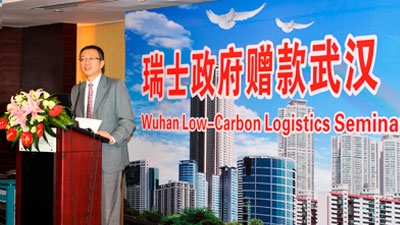As China’s logistics industry is growing steadily amid rising demand, how to build it globally-competitive while reducing its carbon footprint has become a priority for city planners. Government officials, international and domestic experts and representatives from the private sector gathered in Wuhan to brainstorm on solutions.
The Wuhan Low Carbon Logistics Workshop, co-organized by the World Bank, the Swiss Agency for Development and Cooperation (SDC), and the Wuhan Urban Construction Finance Office, facilitated a discussion among the participants on the status and future development of the urban logistics sector in China.
Wuhan is a major transportation hub and logistics center in central China. In 2011, its logistics industry grew over 20 percent year-on-year, accounting for 10 percent of the city’s total GDP.
"Wuhan aims to become a national business, trade, and logistics center which is not only economically efficient but also environmentally sustainable,” said Vice Mayor Liu Liyong in his opening remarks at the workshop.
Having taken place in Wuhan, the workshop gave special attention to the logistics industry of the city, presenting findings of a case study on the Lanyan Logistics Base in Wuhan, a new logistics hub which serves as a demonstration project of modern logistics.
Experts noted that if this new hub would follow the conventional practices of developing logistics hub in China, it could generate unnecessary increase in truck traffic, vehicle mileage, and carbon emission. So, the World Bank and the SDC helped map out a low-carbon development strategy for the new hub while not compromising its performance and economic benefits.
Huang Feng, CEO of Lanyan Logistics Base, welcomed the suggestions - “Logistics industry is traditionally a big energy consumer as well as a heavy emitter of greenhouse gases,” he said, “Adopting low-carbon practices is essential to the industry’s own growth and to achieving the emission reduction goal of the country.”
The case of the Lanyan Logistics Base would also contribute to the improvement of freight logistics planning in China, since many Chinese cities are building logistics hubs without thorough analysis of their impacts on carbon emissions, air pollution and fuel consumption, said Song Su, Transport Specialist for the Clean Air Initiative for Asia Cities (CAI-Asia).
Participants came from different cities across China, including Chongqing, Guangzhou, Suzhou, Ningbo, Fuyang and Xiaogan. They shared local good practices in developing low-carbon logistics parks. Yao Liang, a vice director of Transfer Logistics, based in Fuyang, Zhejiang Province, spoke about an ICT-supported online logistics brokerage platform linking carriers and shippers, which was developed in his city under a public-private-partnership. “This led to a highly efficient utilization of resources,” he said.
"Establishing a national logistics hub is a complex program which demands a great amount of research and development efforts. We know we have a long way to go,” said Xu Bing, Director of the Logistics Development Division, Wuhan Transport Commission. “So we are glad to see that this workshop helped us have a clearer vision – which way we should head for and what methods we should take.”
"Building a green logistics industry is an international trend,” said Ke Fang, a senior urban transport specialist at the World Bank. “This definitely requires collaboration between all parties, especially a strong partnership between public and private sectors.”
"Internationally, we’ve seen many successful cases, such as those in Japan and Germany, which we can learn from,” he said, “but what is more important is to build up local knowledge and to inovate.”

